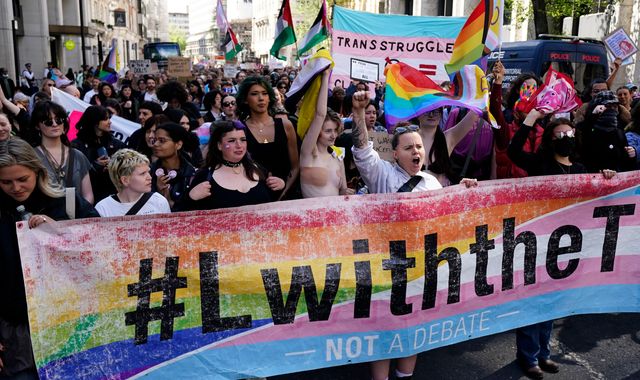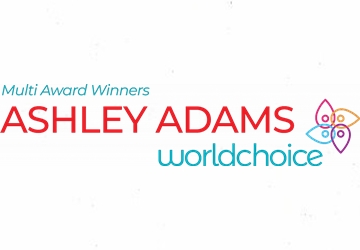Trans rights groups, trade unions and community organisations came together for what was billed as an “emergency demonstration” in Parliament Square in Westminster.
Activists demanded “trans liberation” and “trans rights now”, with some waving flags and holding banners.
A rally and march organised by Resisting Transphobia was also taking place in Edinburgh on Saturday afternoon.
In a long-awaited judgment delivered on Wednesday, the UK’s highest court ruled the terms “woman” and “sex” in the Equality Act 2010 “refer to a biological woman and biological sex”.
It essentially means trans women who hold gender recognition certificates are not women in the eyes of the law.
This means transgender women with one of the certificates can be excluded from single-sex spaces if “proportionate”.
Baroness Kishwer Falkner, chair of the UK’s Equality and Human Rights Commission (EHRC), said on Thursday that the ruling means trans women can no longer take part in women’s sport, while single-sex places, such as changing rooms, “must be based on biological sex”.
The UK government said the unanimous decision by five judges brought “clarity and confidence” for women and service providers.
Meanwhile, a Labour Party source said Prime Minister Sir Keir Starmer had brought the party to a “common sense position” on the subject from an “activist” stance.
Among the groups supporting the London protest were Trans Kids Deserve Better, Pride In Labour, Front For The Liberation Of Intersex Non-binary And Transgender people (Flint) and TransActual.
Keyne Walker, strategy director at TransActual, told Sky News the government needed to put equality laws back on a “sound footing”.
Speaking from Parliament Square, they said: “The mood is jubilant and also angry and also people are anxious… Right now trans people are coming together to demonstrate to the country, and to everybody else, that we’re not going anywhere because we don’t have anywhere to go…
“Queer people have been through worse than this before, and… we’ll suffer through whatever is to come in the next few years.”
Read more:
How Supreme Court decision has immediate real-world consequences
The activist continued: “The government needs to immediately clarify how they are going to protect trans people and what this ruling actually means for spaces.
“It does not bring clarity… businesses and venues at the moment don’t know what they can and can’t do… the government needs to step in and put equalities law back on a sound footing.”
It comes as Bridgerton actress Nicola Coughlan announced she has helped raise more than £100,000 for a trans rights charity following the Supreme Court decision.
Following the ruling, the Irish star said she was “completely horrified” and “disgusted” by the ruling and added she would match donations up to £10,000 to transgender charity Not A Phase.
The fundraiser has since raised £103,018, with a revised target of £110,000.
Why was the case heard in court?
The Supreme Court ruling followed a long-running legal challenge which centred around how sex-based rights are applied through the UK-wide Equality Act 2010.
The appeal case was brought against the Scottish government by campaign group For Women Scotland (FWS) following unsuccessful challenges at the Court of Session in Edinburgh.
FWS called on the court to find sex an “immutable biological state”, arguing sex-based protections should only apply to people born female.
The Scottish government argued the protections should also include transgender people with a gender recognition certificate (GRC).
The Supreme Court judges were asked to rule on what the Equality Act 2010 means by “sex” – whether biological sex or “certificated” sex as legally defined by the 2004 Gender Recognition Act.
Delivering the ruling at the London court on Wednesday, Lord Hodge said: “We counsel against reading this judgment as a triumph of one or more groups in our society at the expense of another. It is not.
“The Equality Act 2010 gives transgender people protection, not only against discrimination through the protected characteristic of gender reassignment, but also against direct discrimination, indirect discrimination and harassment in substance in their acquired gender.”





























